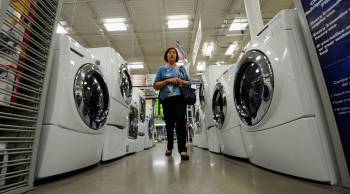Companies spending less on the future
Bob Moon: Hey, at this point, we’ll gratefully accept any positive news we can find in this economy. Today’s bright spot comes courtesy of the Commerce Department,
which reports orders for durable goods rose 4 percent last month. Those are longer-lasting manufactured items — cars, appliances and such.
Good news on the surface, but as our Washington Bureau Chief John Dimsdale reports, there’s still some rain in this government report.
John Dimsdale: True, it was the best showing for factory orders since March. July saw a big rebound for the makers of airplanes, cars and car parts. But just about everything else from electronics to furniture to factory machinery was either flat or down slightly.
Still, economist Paul Dales at Capital Economics thinks July’s investments in durable goods will help the economy avoid a return to recession.
Paul Dales: I do think that these data suggest that the third quarter won’t be a complete write off. We’re probably talking about growth of around 1.5 percent. So, that’s not great, but it’ll certainly be better than a recession.
He says the fact that companies didn’t increase their investments in factory equipment suggests a lack of confidence in the economy’s future, and that was in July.
Morgan Stanley’s Ted Wieseman says August is likely to be a lot worse.
Ted Wieseman: The real question that we’re asking is given how severe the shock to business and consumer sentiment seems to have been in August — the debt limit debate, the S&P downgrade, the continued deteriorations in Europe — whether we get a more prolonged retraction in business spending based on that.
While today’s report points to a relatively strong rebound for U.S. manufacturing, economist Gary Shilling says that hasn’t helped hiring.
Gary Shilling: Unfortunately that’s the reality is that where we are competitive, at least in manufacturing, is because of extreme automation.
Dimsdale: So it’s the robots that are getting all the business?
Shilling: Ha. It’s the robots, and they don’t get big paychecks.
Shilling says the economy is slowing down. He’s forecasting another dip into recession.
In Washington, I’m John Dimsdale for Marketplace.
There’s a lot happening in the world. Through it all, Marketplace is here for you.
You rely on Marketplace to break down the world’s events and tell you how it affects you in a fact-based, approachable way. We rely on your financial support to keep making that possible.
Your donation today powers the independent journalism that you rely on. For just $5/month, you can help sustain Marketplace so we can keep reporting on the things that matter to you.


















